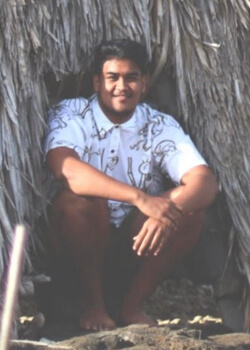Sai-Dudoit performing “Kalamaʻula”
A multi-talented artist who can hit the really high notes and play his own accompaniment, University of Hawaiʻi at Mānoa student Heuaʻolu Sai-Dudoit is no stranger to performing. He has been singing and playing the ʻukulele since he was 9 years old, and was recently named the winner of the 20th Annual Richard Hoʻopiʻi Leo Kiʻekiʻe Falsetto Contest.
The contest provides a platform for preserving and perpetuating leo kiʻekiʻe (falsetto)—a style of music that entails singing at a vocal register higher than one’s usual range. Sai-Dudoit was among five singers competing in this year’s contest, which was held on Maui in September. In addition to his first place title, he also received the special Hawaiian Language and Musicality awards for his stellar performance of “Kalamaʻula.”
“It was a good environment for Hawaiian music,” said Sai-Dudoit. “We all enjoy Hawaiian music and we understand the value of it.”

Although this was his first time competing in the contest, Sai-Dudoit’s specialization in falsetto singing has been many years in the making. His interest in falsetto began in fourth grade, when his substitute teacher who happened to be the granddaughter of Genoa Keawe, a prolific Hawaiian falsetto singer, introduced a Hawaiian falsetto song to the class. He continued singing and honing his craft in the years that followed, and eventually entered a broad singing competition through Mana Maoli in 2021. This year, at the recommendation of a vocal coach with Mana Maoli, he decided to enter the falsetto contest.
“There’s kind of a purity, a clearness, to singing falsetto,” said Sai-Dudoit. “For me, singing it feels good. It’s being able to express the words in the way where people take notice of it and people can enjoy it.”
Musical family lineage
Sai-Dudoit’s contest piece, “Kalamaʻula,” is a well-known Hawaiian falsetto song that holds a special family connection. It was written by Emma Kala Dudoit—his great-great-grandmother on his late father’s side. His Dudoit ʻohana also includes ties to Horace K. Dudoit III, a founding member of Grammy-nominated group Hoʻokena. His mother’s side of the family has a musical lineage of its own—his mother is the niece of Marlene Sai, a Hawaiʻi Academy of Recording Arts Lifetime Achievement Award winning singer.
“A lot of people would choose a song because ‘this one sounds the best,’ or ‘this one is a standard,’ but with the one I picked, I have a connection to the song,” explained Sai-Dudoit. “I chose the song as a way to honor that side of the family—my father and my great-great-grandmother.”
In addition to rehearsing for his performance, Sai-Dudoit did diligent research in the month leading up to the contest. Since “Kalamaʻula” is an older song, many of the lyrics were passed down vocally over time. In order to uncover the original, complete lyrics, Sai-Dudoit carefully examined a Hawaiian language newspaper from the early 1900s, which contained one of the earliest known documentations of the song.
Hawaiian language meets business
A 2021 graduate of Ke Kula ʻO Nāwahīokalaniʻōpuʻu immersion school on Hawaiʻi Island, Sai-Dudoit is now a second-year student majoring in Hawaiian language at the Kawaihuelani Center for Hawaiian Language in UH Mānoa’s Hawaiʻinuiākea School of Hawaiian Knowledge. Alongside his Hawaiian language studies, he is also taking courses at the Shidler College of Business.
In blending Hawaiian language and business, Sai-Dudoit hopes to reinstitute Hawaiian language making use of skills gained through the study of business. Specifically, he is interested in the music industry, and his business studies give him the entrepreneurial background to help him succeed in that enterprise.
“Hawaiian language…it’s fun, it’s interesting, it’s thought-provoking and I’m reintroducing the language and its qualities into business—into a domain where it had once flourished,” said Sai-Dudoit.
—By Alisha Churma

